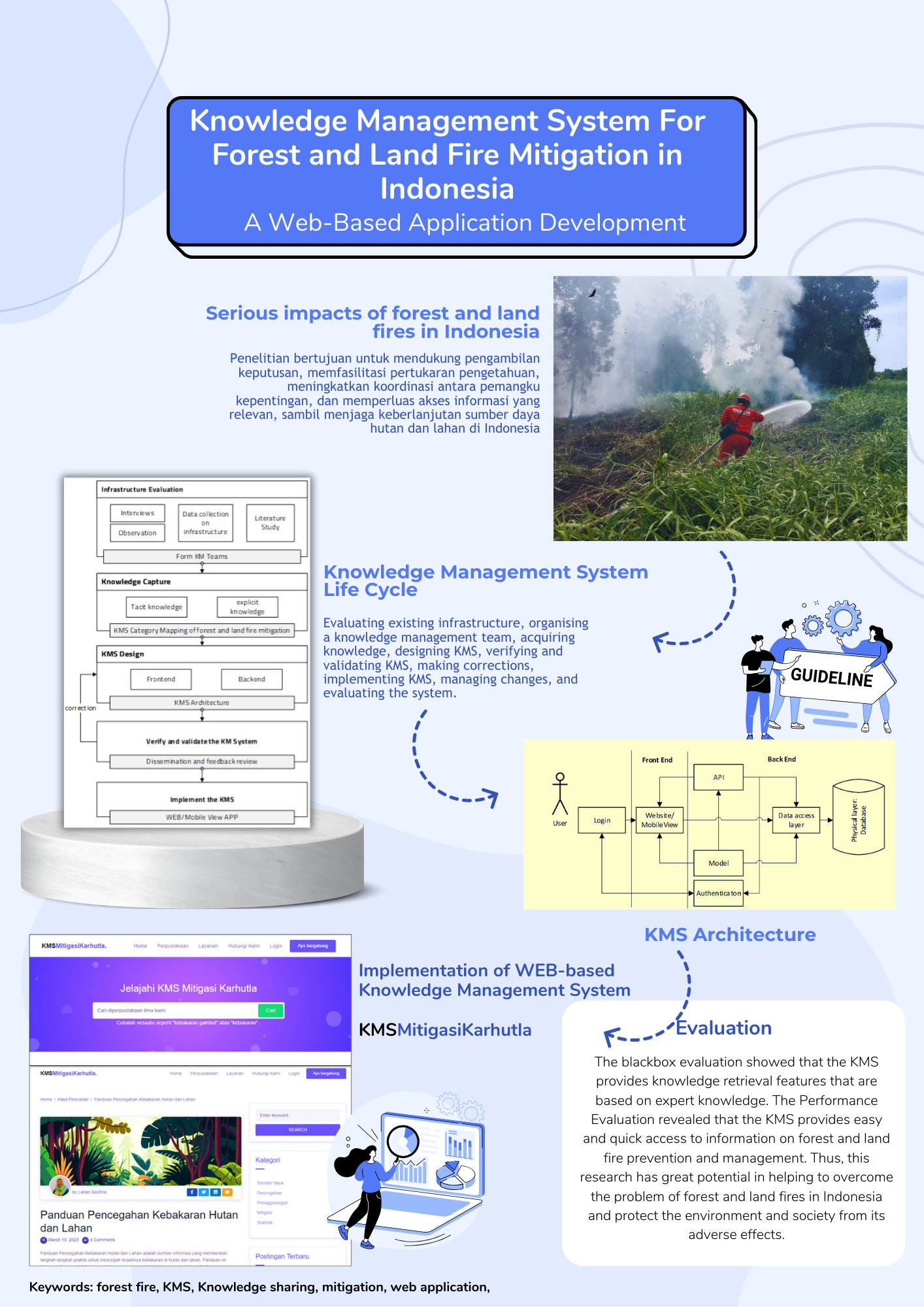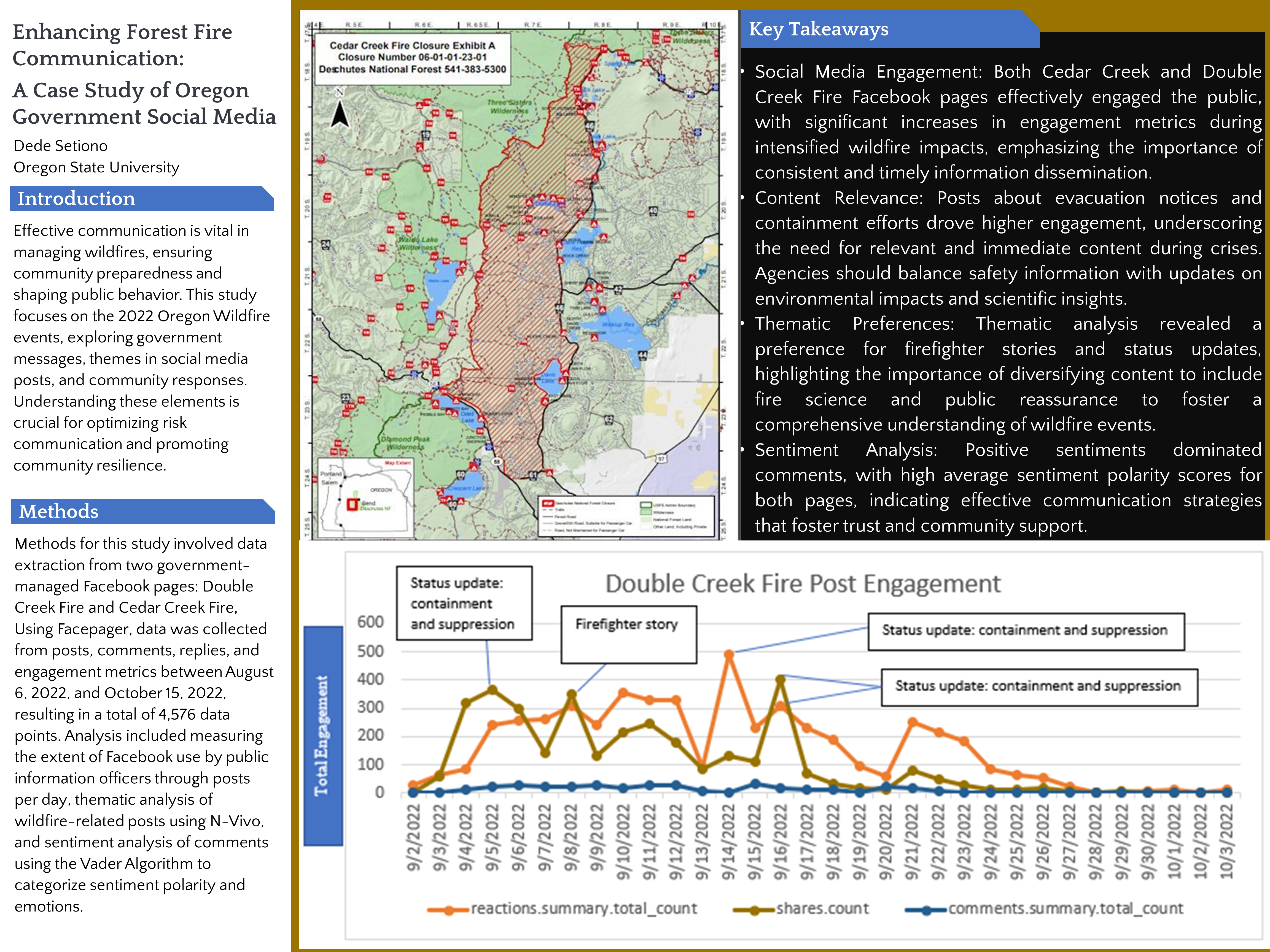Knowledge Management System For Forest and Land Fire Mitigation in Indonesia: A Web-Based Application Development
Abstract
Forest and land fires in Indonesia have serious impacts on many aspects, including the environment, health, economy, politics, and international relations. They cause haze pollution that extends to neighboring countries and peatland degradation. Despite extensive research and mitigation efforts, forest and land fires continue to occur and cost lives. Therefore, effective management and mitigation strategies are required. This research developed a web-based knowledge management system (KMS) using the Laravel framework as an effective forest and land fire mitigation platform. The KMS aims to support decision-making, facilitate knowledge exchange, improve coordination between stakeholders, and expand access to relevant information, while maintaining the sustainability of forest and land resources in Indonesia. The KMS evaluation results cover two important aspects: blackbox evaluation and performance evaluation. The blackbox evaluation showed that KMS provides knowledge retrieval features based on expert knowledge. The performance evaluation revealed that the KMS provides easy and quick access to information on forest and land fire prevention and management. Thus, this research has great potential to help overcome the problem of forest and land fires in Indonesia and protect the environment and society from their adverse effects.
References
Abdul Aziz, R. Z., Maria, D., Laila, S. N., & Azima, M. F. (2020). Development of knowledge management system for determining organizational performances, total quality management, and culture. Journal of Physics: Conference Series, 1529(2), 022063. https://doi.org/10.1088/1742-6596/1529/2/022063
Becerra-Fernandez, I., & Sabherwal, R. (2014). Knowledge management. Systems and processes (2nd ed.). New York: Routledge. https://doi.org/10.4324/9781315715117
Berwyn, B. (2018, August 23). How wildfires can affect climate change (and vice versa). Insideclimate News. https://insideclimatenews.org/news/23082018/extreme-wildfires-climate-change-global-warming-air-pollution-fire-management-black-carbon-co2
Blake, D. M., Stevenson, J., Wotherspoon, L., Ivory, V., & Trotter, M. (2019). The role of data and information exchanges in transport system disaster recovery: A New Zealand case study. International Journal of Disaster Risk Reduction, 39, 101124. https://doi.org/10.1016/j.ijdrr.2019.101124
Bukowitz, W. R., & Williams, R. L. (1999). The knowledge management fieldbook. Pearson Education Ltd.
Dieterle, G. (2009). Sustainable forest management in a changing world: A European perspective. Agriculture, 19, 83–91. https://doi.org/10.1007/978-90-481-3301-7
Gamble, J. R. (2020). Tacit vs explicit knowledge as antecedents for organizational change. Journal of Organizational Change Management, 33(6), 1123–1141. https://doi.org/10.1108/JOCM-04-2020-0121
Gil-Gomez, H., Guerola-Navarro, V., Oltra-Badenes, R., & Lozano-Quilis, J. A. (2020). Customer relationship management: Digital transformation and sustainable business model innovation. Economic Research-Ekonomska Istraživanja, 33(1), 2733–2750. https://doi.org/10.1080/1331677X.2019.1676283
Goldammerl, J. G., & Seibert, B. (1990). The impact of droughts and forest fires on tropical lowland rain forest of East Kalimantan. In J. G. Goldammer (Eds.), Fire in the tropical biota. Ecological studies (analysis and synthesis) (pp. 11–31). Springer.
Greenpeace International. (2018, September 19). The final countdown: Now or never to reform the palm oil industry. Greenpeace. https://www.greenpeace.org/international/publication/18455/the-final-countdown-forests-indonesia-palm-oil/
Holden, Z. A., Swanson, A., Luce, C. H., Jolly, W. M., Maneta, M., Oyler, J. W., Warren, D. A., Parsons, R., & Affleck, D. (2018). Decreasing fire season precipitation increased recent western US forest wildfire activity. Proceedings of the National Academy of Sciences of the United States of America, 115(36), E8349–E8357. https://doi.org/10.1073/pnas.1802316115
Huijnen, V., Wooster, M. J., Kaiser, J. W., Gaveau, D. L. A. A., Flemming, J., Parrington, M., Inness, A., Murdiyarso, D., Main, B., & van Weele, M. (2016). Fire carbon emissions over maritime southeast Asia in 2015 largest since 1997. Scientific Reports, 6, 1–8. https://doi.org/10.1038/srep26886
Israilidis, J., Siachou, E., Cooke, L., & Lock, R. (2015). Individual variables with an impact on knowledge sharing: the critical role of employees’ ignorance. Journal of Knowledge Management, 19(6), 1109–1123. https://doi.org/10.1108/JKM-04-2015-0153
[KLHK] Kementerian Lingkungan Hidup dan Kehutanan. (2022). Status lingkungan hidup Indonesia 2022. https://www.menlhk.go.id/cadmin/uploads/SLHI_2022_upload_final_77f9948571.pdf
Lennertz, R., & Panzer, K. F. (1984). Preliminary assessment of the drought and forest fire damage in Kalimantan Timur: Report of the fact-finding mission, Nov-Dec, 1983. DFS German Forest Inventory Service for German Agency for Technical Cooperation.
Mildon, Z. K., Roberts, G. P., Faure Walker, J. P., Beck, J., Papanikolaou, I., Michetti, A. M., Toda, S., Iezzi, F., Campbell, L., McCaffrey, K. J. W., Shanks, R., Sgambato, C., Robertson, J., Meschis, M., & Vittori, E. (2022). Surface faulting earthquake clustering controlled by fault and shear-zone interactions. Nature Communications, 13(1), 7126. https://doi.org/10.1038/s41467-022-34821-5
Nonaka, K., & Takeuchi, H. (1995). The knowledge-creating company. How Japanese companies create the dynamics of innovation. Oxford University Press.
North, K., & Gita, K. (2018). Knowledge management (2nd ed.). Springer, Cham.
Oktari, R. S., Munadi, K., Idroes, R., & Sofyan, H. (2020). Knowledge management practices in disaster management: Systematic review. International Journal of Disaster Risk Reduction, 51, 101881. https://doi.org/10.1016/j.ijdrr.2020.101881
Robins, L., van Kerkhoff, L., Rochmayanto, Y., Sakuntaladewi, N., & Agrawal, S. (2022). Knowledge systems approaches for enhancing project impacts in complex settings: community fire management and peatland restoration in Indonesia. Regional Environmental Change, 22(3). https://doi.org/10.1007/s10113-022-01960-w
Sadino, Surono, A., & Arifin, M. Z. (2020). Legal analysis on application of strict liability in oil palm plantation fire cases in Indonesia. IOP Conference Series: Earth and Environmental Science, 504(1), 012026. https://doi.org/10.1088/1755-1315/504/1/012026
Singh Sandhawalia, B., & Dalcher, D. (2011). Developing knowledge management capabilities: A structured approach. Journal of Knowledge Management, 15(2), 313–328. https://doi.org/10.1108/13673271111119718
Sitanggang, I. S., Syaufina, L., Trisminingsih, R., Ramdhany, D., Nuradi, E., Hidayat, M. F. A., Rahmawan, H., Wulandari, Ardiansyah, F., Albar, I., & Krisnanto, F. (2022). Indonesian forest and land fire prevention patrol system. Fire, 5(5), 136. https://doi.org/10.3390/fire5050136
Staff, R. (2019, December 11). World Bank says Indonesia forest fires cost $5.2 billion in economic losses. Reuters. https://www.reuters.com/article/us-indonesia-environment-idUSKBN1YF0FJ
Syaufina, L. (2018). Forest and land fires in Indonesia: Assessment and mitigation. In P. Samui, D. Kim, & C. Ghosh (Eds.), Integrating disaster science and management. Global case studies in mitigation and recovery (pp. 109–121). Elsevier. https://doi.org/10.1016/B978-0-12-812056-9.00008-7
Syaufina, L., Rahmawan, H., Trisminingsih, R., Ammarullah, A. N., Sitanggang, I. S., Wulandari, & Ardiansyah, F. (2022). Development of hotspots ground check module in the mobile application for forest and land fires prevention patrol. 2022 International Conference on Electrical and Information Technology (IEIT), 2022, 333–337. https://doi.org/10.1109/IEIT56384.2022.9967891
Taufik, M., Torfs, P. J. J. F., Uijlenhoet, R., Jones, P. D., Murdiyarso, D., & van Lanen, H. A. J. (2017). Amplification of wildfire area burnt by hydrological drought in the humid tropics. Nature Climate Change, 7(6), 428–431. https://doi.org/10.1038/nclimate3280
Ulya, N. A., Waluyo, E. A., Lestari, S., & Premonoi, B. T. (2018). Peat swamp forest degradation: Impacts, affected communities and losses. E3S Web of Conferences, 68, 03007. https://doi.org/10.1051/e3sconf/20186803007
Unik, M., Sitanggang, I. S., Syaufina, L., & Jaya, I. N. S. (2023). PM2.5 estimation using machine learning models and satellite data: A literature review. International Journal of Advanced Computer Science and Applications, 14(5), 359–370. https://doi.org/10.14569/IJACSA.2023.0140538
Wiig, K. M. (1993). Knowledge management foundations: Thinking about thinking: How people and organizations create, represent, and use knowledge (1st ed.). Schema Press, Limited.
Wu, L.-W., & Lin, J.-R. (2013). Knowledge sharing and knowledge effectiveness: Learning orientation and co-production in the contingency model of tacit knowledge. Journal of Business & Industrial Marketing, 28(8), 672–686. https://doi.org/10.1108/JBIM-04-2011-0050
Authors

This work is licensed under a Creative Commons Attribution 4.0 International License.
Jurnal Manajemen Hutan Tropika is an open access journal which means that all contents is freely available without charge to the user or his/her institution. Users are allowed to read, download, copy, distribute, print, search, or link to the full texts of the articles in this journal without asking prior permission from the publisher or the author. This is in accordance with the Budapest Open Access Initiative (BOAI) definition of open access.





